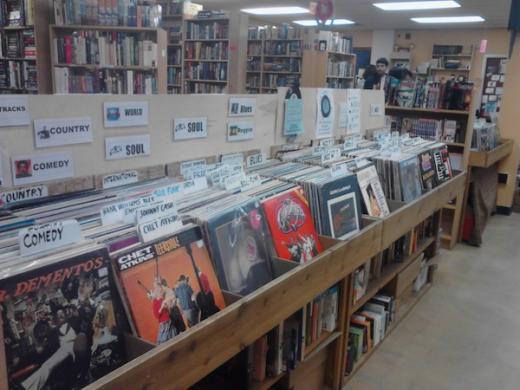Anne Triolo usually starts her shift at Webster’s Bookstore Café with a little bit of jazz. As the day goes on, she turns on some funk or maybe a little bit of classic rock. Whatever genre fits her mood.
“It’s great because I get to explore all kinds of music,” she says about the collection of vinyl located a few feet away from the front counter.
The collection of records, which includes everything from funk to bluegrass, is part of Josh Ferko’s used vinyl operation, Stax of Trax. After graduating from Penn State in 1979, Ferko worked in music stores around town such as Arboria Records for 20 years before opening his own vinyl shop within Webster’s in 2002. In the fall, he will celebrate his 40th anniversary of working in the music business.
“I’ve been at this a long time,” he says. “I’m a veteran.”
While growing up in Pittsburgh, Ferko says bands like the Yardbirds and the Kinks sparked his interest in music and, more specifically, vinyl. As he got older, Jimi Hendrix caught Ferko’s attention before he discovered genres like reggae and blues. His love affair with guitar riffs and funky rhythms is why he has continued to buy, sell and share music.
“I’ve always been a music guy and it’s really been my life since I graduated from college,” he says. “I just love music and I’ve always considered vinyl to be the ultimate format. We all knew on a street level that vinyl was the thing from the beginning and that the record companies had no clue because vinyl would always survive.”
Like other vinyl enthusiasts, Ferko believes that records just sound better. Listeners get a full spectrum of sound because of analog recording. “Digital, no matter what format, is still going to be sampling,” he says. “It’s not the entire spectrum of sound. It’s a trite thing to say, but vinyl gives you that warm, full-range sound.”
Triolo agrees as the relaxing jazz of Herbie Hancock plays throughout the store at a volume where customers can experience the smooth, scratchy sound. “It helps create the mood,” she says before going to flip the record. “The scratches are part of the whole flavor.”
And to make the experience even better, records come with covers and artwork that also attract potential buyers.
“You look at a CD cover and it’s kind of nothing and the next step is Mp3 and it is actually nothing,” Ferko says. “[Vinyl] is the whole package – mainly the sound followed by the artwork. The artifact that’s in your hands. It’s something real.”
In order to keep his business running, Ferko travels all over to find records that are rare, interesting or popular. One day last week he journeyed two hours east to look at some vinyl. The next day he traveled two hours west. Triolo recalls Ferko taking a trip to sift through a collection of more than 5,000 records.
“He has so much experience and knows right away what to look for,” she says. “He’s a real expert.”
The many thousands of records Ferko owns in his personal “sound archive,” which he calls his collection, continues to grow daily – one small advantage to owning a record shop.
And the college town atmosphere has benefited his business. A wide variety of people of all ages and occupations stop in his store to look through records by Eric Clapton, Johnny Cash, Miles Davis, Bruce Springsteen and Stevie Wonder. Triolo, who works at Webster’s five days a week, has rung up customers buying obscure folk and bluegrass records. Even comedy albums by Richard Pryor and Cheech and Chong make their way to the register. When younger customers ask how the records work, she shows them.
“I don’t need every college kid to come into the store and buy records to make a living,” Ferko says. “I wouldn’t be able to keep up with the demand. I think that’s where it’s going to survive, in that niche market.”
As he continues his efforts of keeping vinyl alive, the challenge is just finding good records that people want to hear.
“I think there’s going to be enough people to keep it alive,” he says about the vinyl business in general. “I think it will go beyond being a little cult thing because you hear more people talk about it. Once people get into it, they really get into it.”



